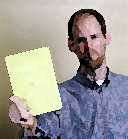
 | On decision making in forensic casework |
Title: On decision making in forensic casework
Author(s): Johan Koolwaaij & Lou Boves
Reference: Forensic Linguistics, the International Journal of Speech, Language and the Law, Vol. 6, Number 2, pp. 242-264
Keywords: Speaker Recognition
There is a PDF version (12137958 bytes) available.
In forensic applications of speaker recognition it is necessary to be able to specify a confidence level for a decision that two sets of recordings have been produced by the same speaker (or by different speakers). Forensic phoneticians are sometimes criticised because they find it impossible to provide 'hard' estimates of the confidence level of their expert opinions. This paper investigates to what extent the problem can be solved by deploying automatic speaker verification algorithms, to work alone or to support the work of forensic phoneticians.
It is shown that, although heavily dependent on operating conditions, one of the advantages of automatic systems is that their performance is in fact measurable. We construct a confidence measure
which takes into account the performance of the automatic system in the past,
the operating conditions and the probative value of the speech evidence as well as that of
the non-speech evidence. It is very important to note that such a confidence
measure will never lead to a fully automatic procedure, since it
still requires human input to weigh the non-speech evidence as well as
human explanation of the procedure followed and, finally, human interpretation.
However, when all conditions are met, this procedure is able to (1) provide
an interpretative measure in the individual forensic case and (2) join together
the strengths of the human interpretation of the non-speech evidence
and the automatic interpretation of the speech evidence, so that finally
the joined performance of human and machine is better than the performance of
one of these in isolation.
Error processing SSI file